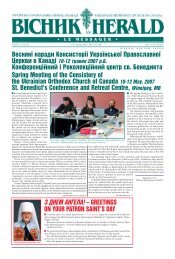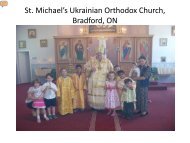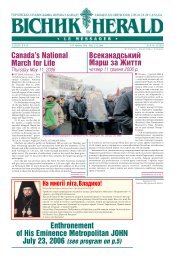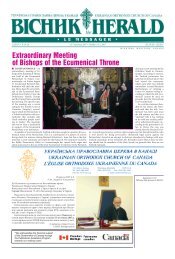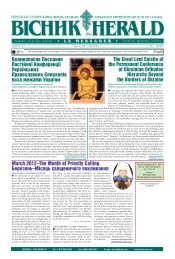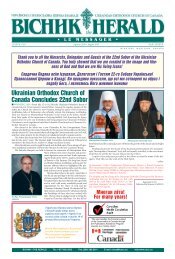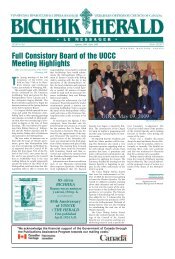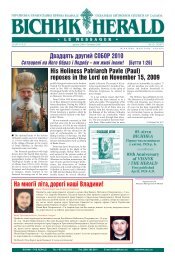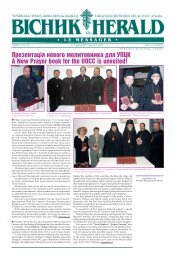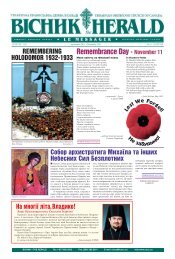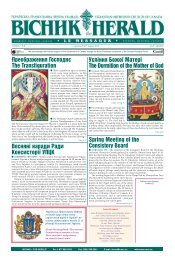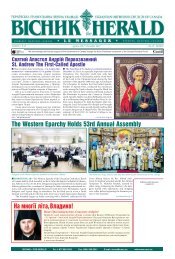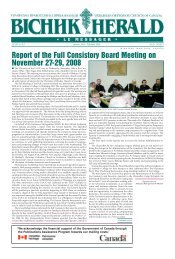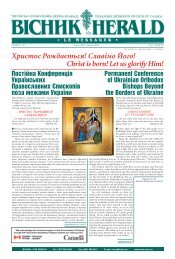18ReflectionsВІСНИКтравень 2011Не забуваймо поминати достойнихне злим тихим словомОб’єктом уваги ставитьсяДанило Скоропадськийn Тут мимоволі пригадується запо -віт, Тараса Шевченка. Мені ж по -дібне було навіяне роздумуваннямпро своє минуле. Мені ось-ось 86. Яжив активним життям, а тепер менізалишилося лише згадувати всепережите, пересвідчене. Звичайновсе це діється в час без сон них но -чей.Останньо, ночами я роздумувавпро багато-чого, згадував свої ранніроки в сані священика в Лондоні,Англія; згадував людей, але мене чо -мусь, не покидала думка про великулюдину того часу, тепер забуту лю -дину,—гетьманича Данила Скоро -падського. Велика був він людина,але він забутий, ніхто його не зга -дує, про нього не пишуть, а він до -брого слова вартий.Данило Скоропадський, син ос -таннього Гетьмана України /ранішегенерал збройних сил/ народився 12лютого 1904 року в Петербурзі, Вмо лодому віці був змушений вийтина еміграцію. Середню й високу ос -віту здобув у Німеччині й Швай ца -рії, 1939 року переселився до Ан глії,де жив і працював інженером вЛон доні. Він був відомий у кругаханглійської аристократії, серед якоївтішався особливою повагою. Я зу -стрівся і зблизився з ним 1950 року,коли був призначений дру гим свя -щеником української пра вославноїпарафії в Лондоні, що тоді була ві -Cyber Confession…(continued from p.13)Cyber-confession is the announcement<strong>of</strong> wrongs without repentance toan impersonal Web site. Christian sa -cramental confession is ownership <strong>of</strong>wrongs and repentance to a personaland caring God. Cyber-confession re -sults in entertainment for others.Christian sacramental confession re -sults in re-connection <strong>of</strong> damaged re -lationships with others and with God.Whether or not you go to confession,and hopefully you do, even if youbelieve that all <strong>of</strong> this is medieval su -perstitions and dead and brittle fairytales, at least let the words <strong>of</strong> this confessionalprayer, penetrate beneath anycynicism, anger, and personal bitterness.<strong>May</strong> these words s<strong>of</strong>ten your heartand lead you to a spiritual father whocontinued from p.14The dinner was a pot -luck, preparedand donated by the Individualparishes that makeup the Two Hills Pa -rochial District. Donations to the FoodBank were accepted in lieu <strong>of</strong> a chargefor the meal. A short program followedby Deeyana Baydala delighting the au -dience with four instrumental selectionsplayed on the Dulcimer.Maria Fedorouk and Deeyana Bay -dala sang two beautiful <strong>Ukrainian</strong>songs. The St. Paul and District Uk -дома як парафія Св. Миколая. Да ни -ло Скоропадський був членом тієїпарафії.У своїх безсонних ночах/розду -мах я згадав його і вирішив заго во -рити про нього в пресі.Данило Скоропадський—людинависокої освіти, англійського чинуджентлемен,—людина високої ку -ль тури, український патріот. Вінпровідник української ГетьманськоїПартії, але вмів жити з провідни -ками інших політичних переконаньрозсудливо/розумно і часто нага ду -вав, що перед кожним важливимпо чином-чином треба думати, чиданий чин буде на добро Україні? Іщо Україна скаже про нього?Гетьманича Данила Скоропад сь -кого поважали/любили скрізь. Вінне був якимсь там політикан том,він дійсний патріот, держав ник.Пригадую, Данило Скоропад сь -кий у церкві /ніколи не на першомумісці/. Хор співас "Святий Боже", ге -тьманич підспівує собі з хором. Ітак завжди.Друга половина лютого I957 ро -ку,—Данило Скоропадський у цер -кві. По закінченні Богослуженнязайшов до нашої канцелярії, запла -тив свою членську вкладку, дав пе -редплату на церковний журнал "Ві -домості" і ми розійшлися. Він, якзвичайно, в повному стані здоров’я,життєрадісний. Але в четвер поЛон доні розійшлася вістка, що ге -can confirm God's love and mercy foryou."Most merciful God, I acknowledgethat I have sinned against you inthought, word and deed, by what Ihave done and by what I left undone. Ihave not loved you with my wholeheart. I have not loved my neighbor asmyself. I am truly sorry and I humblyrepent. Have mercy upon me and forgiveme; that I may delight in your will,and walk in your ways, to glory <strong>of</strong> yourname. Amen"—Fr. John S. BakasFr. Bakas is dean <strong>of</strong> St. Sophia Ca -the dral in Los Angeles and a facultymember <strong>of</strong> Loyola Marymount Uni -versity School <strong>of</strong> Theology.Source:<strong>Orthodox</strong> Observer, January 2011rain ian Cultural Choir under the di -rection <strong>of</strong> Rodney Shapka then sangseveral <strong>Ukrainian</strong> folk songs as well asthe <strong>Ukrainian</strong> National Anthem in ho -n or and respect to Bishop Ilarion. Inhis address to the parishioners, HisGrace thanked the parochial districtfor the invitation and the hospitalityand encouraged everyone to continueto work and support the churches inthe parochial district.Several raffles followed. Dobr. Dom -ka Sapiha, donated a framed paintingthat she painted herself, which wasтьманич тяжко захво -рів, він у лі карні, йогооб служено таїнствамиСпо віді /При частя, а 23лютого він віддав Богудуха. /В де яких доку -ментах да ту упокоеннягетьма нича подають по-різ но му/.Похорон гетьманичаДанила Ско ропадсь ко -го відбувся 2 березня1957 з участю великоїгромади лю дей. Я буводин з 6-ти свяще ни -ків, що хоронили його.Данило Ско ропадськийпохований на цвинтаріГемстед, у Лондоні, Ан -глія.У той час ми про цене думали, але скоровиявилося, що гетьма нич не помер,він був отру єний. То був час, колипівнічні генії зла—со вітська агенту -ра, ви нищу ва ли ук ра їнських про -від ників, як ра ніше уби ли СимонаПетлюру, Єв гена Коно вальця, Сте -па на Бандеру і багато ін ших. Ті геніїзла не тільки убивали людей, а тру -їли їх речови на ми, які завдавалижертвам тяж ких терпінь, тоді вониOn Sunday at the Hierarchical DivineLiturgy, he con fer red Very. Rev. Fr.Jaroslaw Bucio ra as a Mitred Archpriest.He was assisted by Proto deaconTaras Maluzynsky who ac companiedHis Gra ce from Winnipeg. Also assistingduring the Liturgy were Orest Bucioraand Robert Spence.At tending from out <strong>of</strong> town wereFr. Bu ciora’s two sons, Ihor from StockholmSweden and Orest, his wife Ireneand daughter Elisa from London, Ontario,and Maria his sister from Montreal,PQ. A banquet hosted by the parishwas held at the Port Arthur ProsvitaVisit <strong>of</strong> His Grace Bishop Ilarion to Two Hills Parochial Districtwon by Frances Elkow. 50/50 raffleprizes were won by Sonja Gali chow ski,Ernie Skakun, Judy Kendal and Eli -zabeth Chomik. The winners all donatedback their winnings to the ParochialDistrict. Door prizes <strong>of</strong> a beautifulfresh flowers and fresh fruit centerpiececreated by Marlend Olmstead was wonby Dana Yaremchuk. An angel wallhang ing donated by Carole My shaniukwas won by Walter Eliuk. The afternoonended with Fr. Wasyl thankingthe Bishop for his visit to the Pa rochialDistrict and with the entire Congre ga -неминуче вми рали. Так за нашихднів про бу вали знищити ВіктораЮщенка, але австрійські лікарі вря -тували його.Згадуючи Гетьманича ДанилаСко ропадського, оцим проголо шу -ємо Йому Слава! та вічна йому па -м’ять!—Степан Ярмусь,ПротопресвітерHis Grace Bishop Andriy’s Visit…continued from p.16CANTOR POSITION:ST. MICHAEL’S UKRAINIAN ORTHODOX CHURCHIN EDMONTON, ALBERTAHAS A POSITION OPEN FOR A CANTOR.FOR MORE INFORMATION, PLEASE PHONE780.473.9201Cul tur al Centre.The Zorya Dancers perform ed aspirited dance and Andrijka Wary wodaand Simon Dolega presented a movingBandura Duet. Father Vladimir Chvets<strong>of</strong> the <strong>Ukrainian</strong> Catholic <strong>Church</strong> <strong>of</strong>the Transfiguration, Father An drij Pe -tresin <strong>of</strong> the <strong>Ukrainian</strong> Ca tholic <strong>Church</strong><strong>of</strong> the Holy Cross and Fa ther NikolaosTambakis <strong>of</strong> the Holy Trinity Greek<strong>Orthodox</strong> <strong>Church</strong> also at tended. Themembers <strong>of</strong> St. Volody myr’s parish we -re most grateful for the visit by HisGra ce Bishop Andriy.Submitted by—Gene OnchulenkoPhoto credit: Ihor Bucioration wishing the Bishop ma ny rewardingyears as a Leader <strong>of</strong> the WesternEparchy <strong>of</strong> the <strong>Ukrainian</strong> Or thodox<strong>Church</strong>. President and Chair personCarole Myshaniuk also thanked BishopIlarion, Fr. Wasyl, the assisting Dea cons,the children and entertainers for makingthis day very special and me mor -able and for inspiring all in attendance.The day was enjoyed by all who at -tended and everyone is already lookingforward to the next Thanksgiving service.Submitted by—Carole Myshaniuk and Elsie ChobanВІСНИК • THE HERALD Tel.: 1-877-586-3093 Fax: (204) 582-5241 E-mail: visnyk@uocc.ca web:www.uocc.ca
THE HERALD<strong>May</strong> 2011Summer Institute on Social Justice: Teaching the<strong>Ukrainian</strong> Famine -Genocide (Holodomor) and the<strong>Ukrainian</strong> Canadian Internment (6 credits)This special summer institute explores the meanings <strong>of</strong> social justice, humanrights, genocide and totalitarianism within the context <strong>of</strong> two case studies: oneCanadian and one European. The Canadian case study is the internment <strong>of</strong> Uk -rain ian Canadians in Canadian prison camps during World War One. The Eu -ropean case study is the <strong>Ukrainian</strong> famine-genocide <strong>of</strong> 1932-33, called the Holo -domor.These two events challenge how we think about social justice within the 21stcentury. An amalgam <strong>of</strong> history, culture, media, the arts and pedagogy, thiscourse will present a unique opportunity to examine any horrific event within ateaching and learning perspective.The course will provide a historical context <strong>of</strong> the two events, beginning withan overview <strong>of</strong> the history <strong>of</strong> <strong>Ukrainian</strong> Canadians and <strong>of</strong> Ukraine, seen withinthe broader context <strong>of</strong> 21st century Canadian and world history. The internmentand famine case studies will be examined in depth focusing on content, context,subtexts and pedagogy.The pedagogy component will be aimed specifically at teachers from Gradesk-12, and will examine ways <strong>of</strong> learning about horrific events, including contemporarytechnology-based ideas such as webquests, databases, online and mo -bile teaching methodologies. However, this course is not only aimed at teachers.Others, including graduate students, will have the opportunity to explore contentissues, or examine how horrendous events are introduced into the classroom.The course facilitators are Drs. Orest Cap and Denis Hlynka. Both arelong time pr<strong>of</strong>essors in the Department <strong>of</strong> Curriculum, Teaching and Learning.In addition to the designated instructors, the course will extensively draw uponcontent experts, both in person and via teleconferencing from Manitoba andacross <strong>Canada</strong>.Some <strong>of</strong> the highlights <strong>of</strong> the course include:• An opportunity to view critical documentary films dealing with the Intern -ment and Holodomor.• A look at why the Canadian government treated minorities as enemy aliens,during World War One, whether <strong>Ukrainian</strong>, German, or Austrian, and how thisextended to the treatment <strong>of</strong> the Japanese Canadians and others in World War Two.• A discussion <strong>of</strong> how RaphaelLem kin, the man who coined the term"genocide", defines that term relevantto the Holodomor.• An examination <strong>of</strong> George Or -well’s fantasy novel Animal Farm and… a little known fact … how it mightbe conceived <strong>of</strong> as a depiction <strong>of</strong> the<strong>Ukrainian</strong> famine.• A study <strong>of</strong> how these issues fit in -to the Manitoba school curriculum,Internment recognition -presented by curriculum specialistsCastle Mountain, Alberta.from Manitoba Education.The institute will be run as a two week 9 a.m.-5 p.m. program. Final assignmentswill be due two weeks after the end <strong>of</strong> the course. The course is directlyaimed at teachers at all levels, but is also relevant to Master’s and doctoral studentsin education, in history, in political studies and students doing advancedwork in peace and justice studies.The Institute is worth 6 credit hours and is a viable component within thePBDE program, as well as for a MEd/PhD program (with advisor’s permission),and potentially transferable to other faculties and universities as well. It is hopedthat students from across Canadian universities will take advantage <strong>of</strong> thisunique and first time Institute. The course is also available to auditors. Ac com -modations for the two weeks are available from St. Andrew’s College in Win -nipeg (204 474 8895).Grounded in the Faculty <strong>of</strong> Education, this Summer Institute is supportedthrough grants by the Shevchenko Foundation and the University <strong>of</strong> ManitobaInnovation Fund, and is assisted by The Centre for <strong>Ukrainian</strong> Canadian Studiesat the University <strong>of</strong> Manitoba.Dates: July 4-15, 2011 9 AM – 5 PMContacts: Dr. Orest Cap - 474-9073 ocap@cc.umanitoba.caDr. Denis Hlynka 474-9062 dhlynka@cc.umanitoba.caHow to register:Contact the Summer Session Office 474-6963 or474-8008 or the Centre for <strong>Ukrainian</strong> Canadian Studies @474-8907EducationHolodomor – Genocide Memorial - Kyiv.19WISDOM OF OUR FATHERS“Pascha <strong>of</strong> beauty! The Pascha <strong>of</strong> the Lord! A Pascha worthy <strong>of</strong> all honorhas dawned for us! Let us embrace each other joyously: Pascha! Ransomfrom affliction!”—Paschal CanonВІСНИК • THE HERALD Tel.: 1-877-586-3093 Fax: (204) 582-5241 E-mail: visnyk@uocc.ca web:www.uocc.ca



